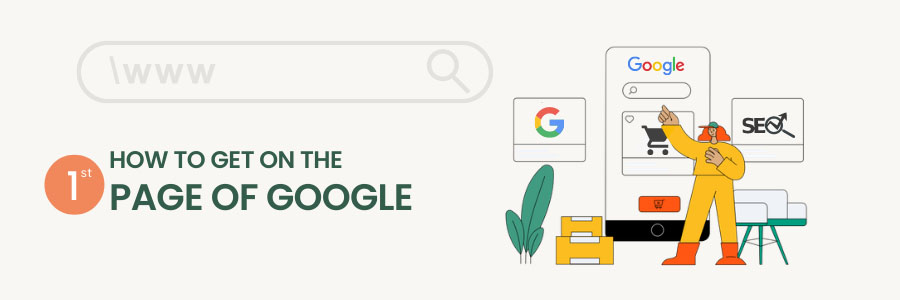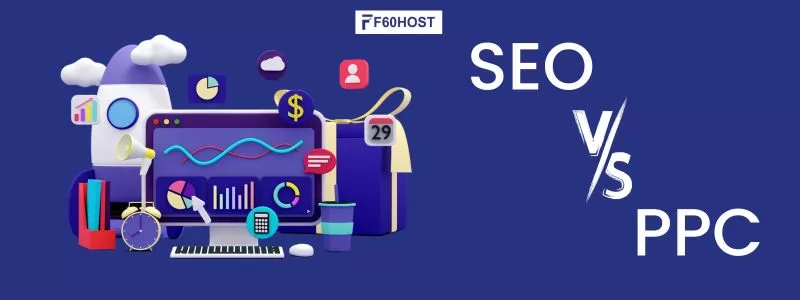How To Get On The First Page Of Google

One of the frequently asked questions is how to get on the first page of Google.
How often have you heard someone say: “Just Google it.” Probably a lot of times, think about how important it would be for your website to be on the 1st SERP.
To accomplish so, you must compete with every other company in your field. Some of them have worked with you for years. Some companies have marketing departments that are far larger than yours. Some have marketing budgets that exceed the total budget of your company.
Is it still possible to get to the first page? Yes. It takes time, effort, and a thorough understanding of your assignment, from search engine optimization keywords to Google search outcomes.
Different ways to get on the first page of Google for free
Getting on the first page of Google is a frequent ambition among small business owners. Google prioritizes quality over quantity. As a result, having a larger company or a higher budget does not guarantee first place.
There are various elements that go into Google’s algorithm, and because Google’s results page has so many diverse components, different sorts of media can rank on the first page.
Select your keywords
Determine which Google search queries you want your website pages to respond to first. These are referred to as keywords, which might be single words or phrases.
For Example:
“restaurant near me”
“Domain name”
“how to get on the first page of Google”
“f60 host”
Not only does being on the first page of Google improve traffic to your website significantly but not being on the first page of Google has a serious flaw.
Tell Google about the keywords you’re using
Google crawls the internet, ranks the millions of sites it finds, and stores them in an index. When a user conducts a search, Google can swiftly retrieve relevant results by scanning its more organized index (rather than the entire web).
Put keywords in the following places:
- Meta title
- Meta description
- URL
- Alt tags
Optimize for mobile
A website that is not responsive will not appear at the top of a Google search. Phones and tablets are now used by consumers more than computers and laptops, and mobile devices are used for the majority of local searches.
As a result, Google prefers websites that are mobile-friendly. In fact, mobile-first indexing is now used to index all sites.
Responsive design is ideal because your website will adapt to any screen size while maintaining functionality.
If you don’t have a responsive website, there are some changes you can make to ensure the most seamless experience for a mobile user.
Focus on user experience
Being mobile-friendly is insufficient for a website. It should also be visually appealing and user-friendly.
A website with easy navigation, clear calls to action, and answers to your visitors’ most pressing questions will keep them on your site longer and return later, which Google will notice and rank you higher for.
The higher you rank, the more traffic your site will receive and the more likely it will appear on the first page.
The quantity and quality of inbound links
If other sites link to yours, particularly large important sites with content related to yours, Google will rank your site higher. Third-party links to your website act as a “thumbs up” or vote of confidence to Google, signaling that your content is worthy of being pushed higher up the SERP.
You’re Never Done, So we have Other Steps to Rank on the First Page Of Google
Google My Business
Claim and optimize your Google My Business listing, especially if you only serve your local community (like a bakery or plumber). Then, gather as many positive reviews as possible. This greatly increases your chances of appearing above the first organic listing in the Local Map pack section. If done correctly, this can be extremely beneficial!
Start a Blog
Starting a blog and posting articles on a regular basis is one of the best things you can do to rank highly on Google. If you’re stuck for ideas, consider the top five questions your customers ask you.
Then, one blog post per question, write a thorough response to each question. Have you noticed the title of this blog post?
Get a Few Quality Links
Create a contest or giveaway in collaboration with a non-profit in your community. Maybe the local paper will notice and give you some free publicity (and a link to your website).
Join your local Chamber of Commerce or BNI and have your business listed on their website. Offer to write a guest article for the local newspaper or community magazine. In your bio at the end of the article, they will frequently include a link to your website.
Create Citations
What exactly is a citation? A citation is a listing of your company in a local directory.
Check sites like Yelp, Foursquare, YP.com, Angie’s List, and others to ensure that your business is listed and that the information is correct.
This contributes to the development of a robust link profile for your domain name and signals to Google that the information they find on your site can be trusted because it is found on other sites across the web.
How does the first page of Google ranking benefit your business?
It’s important to understand the different goals that getting a top ranking on Google can help your business to achieve.
1. Improve your visibility
Let’s say you have a physical location. Which would you prefer, putting your business on the main road that runs through town or a quiet side street? Of course, the main road.
With 167 billion searches per month, ranking on Google’s first page is like locating your business on the busiest street in town.
The more people who visit your website, the more people are aware of your brand. Consumers will be more receptive to conversion activities if they are familiar with your brand.
2. Increase your lead generation
What if you had to choose between a diverse town’s main street and a town with ideal customers? There are as many Google first pages as there are search queries.
Your goal is to appear on the first page of search results for queries performed by your ideal customers. This allows you to be found by consumers who are searching online with the intent to buy or engage.
These are the people who are most likely to convert into leads and customers for your company.
3. Boost engagement
According to Adweek, 81% of shoppers conduct online research before making a purchase, and Google is the go-to source for this.
Google’s search engine results page alone enables consumers to learn about, compare, and engage with your business before even clicking on your result, with answer boxes, the “People also ask” section, and local results showing contact information, maps, and reviews, ratings, and descriptions.
4. Earn the trust
Google’s algorithm is programmed to detect spam, suspicious content, and low-quality content.
If you consistently appear on Google’s first page, it means that Google regards you as a reliable source of information, and consumers trust businesses that Google regards as reliable.
To Conclude
That’s all there is to it! Everything you need to know about getting your website to the first page of Google.
Understanding how to rank on the first page of Google for relevant keywords is a critical skill to master in order to drive traffic to your website.
If you want to know about the core elements of SEO: On-Page SEO and Off-Page SEO you should read our blog and also check out our other blogs



